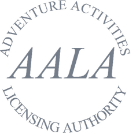Outdoor Instructor Training – A Career in Adventure
A third of our lifetime is spent working.
That’s over 30% of your entire existence doing something day-in, day-out.
If you DON’T love what you do, then it’s a pretty depressing thought.
The Covid Pandemic has certainly made many people stop and contemplate their life choices and career direction.

Enduring lonely furlough periods, job uncertainty and restricted movement outside our homes, has brought a few things into very sharp focus:
- Meaningful, enjoyable work makes life so much better
- Being outdoors is SO important for our mental health
- Working with people who share your passions is wonderful

A career working in the Outdoor Industry is such a game-changer for many people. A physical, outdoorsy job is sociable, great for the body and great for the soul.
How to change your career and become An Outdoor Instructor
Step 1 – Find an Outdoor Instructor Course
There are a few course options across the UK. It’s well worth booking in a few open days and get a feel for each centre and what they offer.
You can book a free open day https://beta.landandwave.co.uk/outdoorinstructortraining/
Step 2 – Coastal, Rural or Mountainous
Outdoor Instructor courses tend to last 3 months, so make sure the location sets your soul on fire. Do you crave beach life and rolling hills, or are dramatic mountains and valleys more your thing? Land & Wave is based in summer Dorset on the South Coast; perfect if you like golden beaches, excellent climbing locations and stunning countryside.

Step 3 – Check the qualifications
Different centres offer different qualifications. Always check you’re gaining lots of National Governing Body qualifications during your course.
In-house qualifications are often offered on apprenticeship schemes – these are only useful while you are working at that particular centre. Other Outdoor Centres are unlikely to recognise these when you are applying for jobs.
Step 4 – Pay up front or work off your course fees?
Some centres offer apprenticeship schemes or free training in return for you working for them for a period of time. You would often live onsite.
Pros – No upfront costs, a job straight after your finish the course
Cons – Tied into working for that company, long period with very limited earnings
Opting for a course where you pay in full is a big financial outlay, but this can be offset using a loan or credit card and you can spread the payments over a longer period of time. It means you are free to work for whoever you like after the course.

Join Us For A Free Outdoor Instructor Training Open Day
https://beta.landandwave.co.uk/outdoorinstructortraining/





